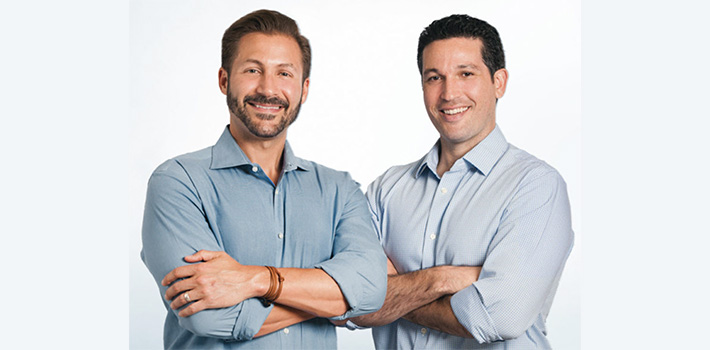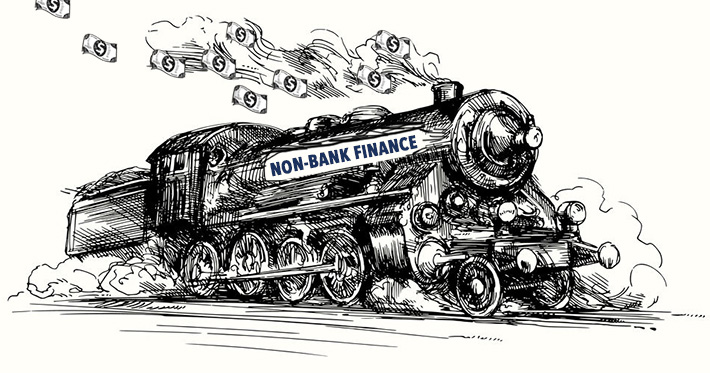Archive for 2021
Fundworks Completes a Refinancing of its Capital Structure of up to $70 Million
July 13, 2021 VAN NUYS, CA, July 13, 2021: The Fundworks, LLC, a leading a tech-enabled small business finance company, announced the recent closing of a $25.0 million Credit Facility with a commercial bank and the sale of $20.0 million of Senior Secured Notes to a group of U.S.-based institutional investors. The Credit Facility is expandable up to a maximum of $50.0 million, representing a total capital raise of up to $70.0 million. These transactions refinanced the Company’s existing Senior Credit Facility and subordinated debt and provide substantial excess capital to fund the continued growth of its small business funding platform.
VAN NUYS, CA, July 13, 2021: The Fundworks, LLC, a leading a tech-enabled small business finance company, announced the recent closing of a $25.0 million Credit Facility with a commercial bank and the sale of $20.0 million of Senior Secured Notes to a group of U.S.-based institutional investors. The Credit Facility is expandable up to a maximum of $50.0 million, representing a total capital raise of up to $70.0 million. These transactions refinanced the Company’s existing Senior Credit Facility and subordinated debt and provide substantial excess capital to fund the continued growth of its small business funding platform.
“We are very pleased to announce this financing, which will allow us to significantly expand our ability to provide funding to our small business client base,“ said Co-Founder and Chief Executive Officer, Evan Smiedt. “This new capital strategically positions The Fundworks to be the funder of choice for small businesses as they re-accelerate growth after a difficult and uncertain 2020. Quick access to capital is key for small businesses to succeed and we are very happy to be well capitalized when our clients need us the most.”
“Given the volatile markets and challenging funding environment in our sector, our ability to close these transactions with multiple, large and established financial institutions is a strong endorsement of the The Fundworks and the continued efforts by our employees and partners to put our clients first,“ said Bradley Smiedt, Co-Founder and Chairman. “We look at the closing of this financing as a significant next step in the growth and success of our Company.”
Brean Capital, LLC served as the Company’s Exclusive Financial Advisor and Placement Agent on both transactions.
About The Fundworks:
The Fundworks is a tech-enabled finance platform providing working capital solutions to merchants to grow their businesses, take advantage of short-term opportunities and fund seasonal business fluctuations. The Company’s proprietary technology platform makes the opaque, time-consuming process of obtaining capital simple, fast and reliable. Since inception, Fundworks has funded nearly $400 million to over 8,300 small businesses throughout the United States. The Company is headquartered in Van Nuys, CA. For more information, please visit: https://www.thefundworks.com/.
For more information/ questions/ interview requests / media inquiries, please contact: Evan Smiedt
Email: info@thefundworks.com | Phone: (844) 644-FUND
Cross River Bank Makes Moves as Fintech Acquirer, VC
July 13, 2021 Known in the space as the fintech partner bank, Cross River took another step down the path leading the industry: Last month, the bank bought PeerIQ, a company that does data analytics for loan underwriting. The bank also launched a venture capital arm to continue investing in startup fintechs in a more formalized way- though they have been partners for years.
Known in the space as the fintech partner bank, Cross River took another step down the path leading the industry: Last month, the bank bought PeerIQ, a company that does data analytics for loan underwriting. The bank also launched a venture capital arm to continue investing in startup fintechs in a more formalized way- though they have been partners for years.
“PeerIQ is a company we’ve known for a number of years; we’ve been working with them, partnering with them and in various ways for two or three years,” Phil Goldfeder, Senior Vice President of Public Affairs at Cross River, said. “We recognized that we would probably better serve our customers and partners if we came together, so we’re happy that we’re able to acquire Ram [Ahluwalia, CEO of PeerIQ] and his team at PeerIQ and we’re excited about the collaboration moving forward.”
PeerIQ will function as a part of Cross River, bringing intelligent analytics to every transaction. Cross River, located 14 floors up just across the George Washington Bridge in New Jersey, has about $13.5 billion of assets and has originated more than $46 billion in loans since 2008, Bloomberg estimates. The way forward, as Goldfeder said, was through innovation, leveraging tech and teams like PeerIQ’s to better serve clients. That also means using the formal VC branch to help new firms grow their platforms and future acquisitions.
“Number one is to grow on PeerIQ’s core business, providing data analytics, and creating technology in the secondary market, but more importantly, for Cross River to help our partners and our clients serve,” Goldfeder said. “There’s, no question that we will continue to explore companies that would help strengthen Cross River and the fintech ecosystem and provide additional services to our partners.”
 The bank has over 15 partnerships with top fintechs, like publicly traded Affirm, Rocket Loans, Coinbase, and private firms funded through VC rounds like Stripe. The bank most recently became a significant part of the PPP government emergency loan program. Ranking among giants like JP Morgan and Bank of America, Cross River ranked 6th overall for dollar amount approved. According to the bank, they doled out 490,000 PPP loans for a total of $13 billion, making up 4% of the entire program volume.
The bank has over 15 partnerships with top fintechs, like publicly traded Affirm, Rocket Loans, Coinbase, and private firms funded through VC rounds like Stripe. The bank most recently became a significant part of the PPP government emergency loan program. Ranking among giants like JP Morgan and Bank of America, Cross River ranked 6th overall for dollar amount approved. According to the bank, they doled out 490,000 PPP loans for a total of $13 billion, making up 4% of the entire program volume.
The way forward is clearly through embracing what it always has been at its base: the bank across the Hudson that is willing to partner with upstart brands and help them take over the world. With a flurry of consolidation purchases in the “post-pandemic” world (if that isn’t too early to say) that are only going to increase, Cross River seems to be on to something. Goldfeder said that Covid showed the rest of the world what the fintech space has known for ten years, that added value for customers and partners means innovation.
“Post-pandemic, where I think there was a larger recognition from the financial services industry of the need to innovate,” Goldfeder said. “Cross River is always known that we need to innovate… The post-pandemic dynamic we recognize that there’s tremendous value in creating a more formal venture arm to examine, explore companies that we can invest in to help them grow, help them succeed, and …. increase our support of our partners.”
Bloomberg reported Cross River is in secret talks to raise $200 million of funding at a valuation of $2.5 billion or more. The bank previously raised $100 million in 2018 in a round led by KKR, deBanked reported, and in 2016 raised $28 million.
NYC is Back, So is it Time to Buy Here?
July 12, 2021Now that New York City is back, opportunity abounds to move in or make money off the dynamic real estate market. You might be able to get in on it even if you’re a first time investor. To size up the market and the common questions to consider, we spoke one on one with Erin Sykes, the Chief Economist of Nest Seekers International.
You can also watch it here on deBanked TV.
Watch More from deBanked’s Real Estate Investing Docuseries Here.
LendUp Stops Making New Loans
July 10, 2021 LendUp, a fintech lender that hoped to disrupt the payday loan industry, is no longer making new loans. A note posted on its website said “We are currently not offering loans to new customers.”
LendUp, a fintech lender that hoped to disrupt the payday loan industry, is no longer making new loans. A note posted on its website said “We are currently not offering loans to new customers.”
When deBanked sat down with the now former CEO Sasha Orloff in 2017, he said that their product was simply cheaper and more flexible.
“The easiest person to convince that we’re a better product is an existing payday user because it’s slightly cheaper at the beginning, it gets much cheaper over time,” he said then. “It has a lot more flexibility.”
But for all the bells and whistles, their still relatively high rates generated a target on their back with regulators.
In 2016, for example, the CFPB said “[LendUp] did not give consumers the opportunity to build credit and provide access to cheaper loans, as it claimed to consumers it would.”
Balancing the messaging with the reality seemd a difficult task.
Orloff stepped down in January 2019, but in less than two years the CFPB took a second crack at LendUp for allegedly violating the Military Lending Act.
In January of this year, LendUp settled the charges, agreeing to pay $300,000 in redress to consumers and to pay a $950,000 civil money penalty.
As recently as April, LendUp’s website was still offering loans with a promoted APR of 400%.
Idea Financial’s Co-Founders Weigh In On Their New $84M Credit Facility and Future
July 9, 2021 Miami-based Idea Financial closed on an $84 million warehouse facility with the Specialty Finance Division of Synovus Bank and Hudson Cove Capital Management. Co-founders Larry Bassuk and Justin Leto said the funds are going right toward financing their pandemic proof SMB line of credit product and supporting their one-of-a-kind litigation insurance and plaintiff-lawyer financing.
Miami-based Idea Financial closed on an $84 million warehouse facility with the Specialty Finance Division of Synovus Bank and Hudson Cove Capital Management. Co-founders Larry Bassuk and Justin Leto said the funds are going right toward financing their pandemic proof SMB line of credit product and supporting their one-of-a-kind litigation insurance and plaintiff-lawyer financing.
“We’re still firing on all cylinders with our flagship line of credit products with small businesses, and Synovus and Hudson Cove are going to allow us to use these facilities to finance the litigation cost finance product,” Leto, who serves as the CEO, said.
The two former lawyers will draw from their experience in insurance, their legal backgrounds, and SMB underwriting to create a product that serves contingency lawyers called Level Esq. Often overlooked, the founders said law firms are just like other small businesses.
 “Not only our experience as lawyers but also our experience as fintech lenders; we’re bringing all that expertise to bear here, and this is the culmination of our experience in finance, law, and insurance,” Bassuk, president of Idea Financial said. “Not only is our product going to be revolutionary and the best in market, but the customer experience is going to mirror the experience that our small business customers have.”
“Not only our experience as lawyers but also our experience as fintech lenders; we’re bringing all that expertise to bear here, and this is the culmination of our experience in finance, law, and insurance,” Bassuk, president of Idea Financial said. “Not only is our product going to be revolutionary and the best in market, but the customer experience is going to mirror the experience that our small business customers have.”
They focus on contingency firms — cash-dependent practices where lawyers invest their own money to back plaintiffs in injury and compensation cases. If there is no victory, there is no payout, so their other company, Level Insurance, offered protection for lawyers left holding the bag in the case of failure.
“Larry and I invented a first and only-of-its-kind insurance product that allows plaintiffs lawyers to protect all of their cost investment for their case,” Leto said.
The new brand coming soon, Level Esq., will offer a loan upfront to finance cases, while Level Insurance has lawyers’ backs with insurance if cases fall through.
“We’re providing an actual line of credit, loans, or small business loans for the lawyers themselves, so they finance their case costs. It’s a pretty revolutionary product and we’re doing it the way we financed small businesses,” Leto said. “Lawyers will be able to tap into that fintech side of our business. If it currently takes weeks if not months to get this type of financing, you’ll be able to do it in hours or days.”
In general, Bassuk said the warehouse closing is a sign that the hard work during the pandemic paid off, and Georgia-based Synovus Bank and Jersey-based Hudson Cove noticed.
“Over the last year, 18-months-plus since the beginning of Covid: our underwriting methodologies, our risk management, management strategies, and our operations were validated,” Bassuk said. “And I think that’s also something that Synovus and Hudson Cove noticed is that our business model, our portfolio performed exceptionally well under stress and during Covid, and I think that’s another contributing factor that led us to where we are.”
Leto and Bassuk recently starred in a deBanked TV docuseries about doing business in Miami.
The Biggest Expansion Period of Our Lifetime? The Non-Bank Finance Industry Says Full Steam Ahead
July 8, 2021 Erez Stamler, Managing Director of Fresh Funding, said that the events of the past year has been an up and down ride, from the initial shutdown shock to rushes in demand. Now that the world is back, those that survived are here to stay and need capital to grow.
Erez Stamler, Managing Director of Fresh Funding, said that the events of the past year has been an up and down ride, from the initial shutdown shock to rushes in demand. Now that the world is back, those that survived are here to stay and need capital to grow.
“At first the system was in shock, then a phase where we saw a strong spike in submissions [where] the owners were probably looking for some sort of PPP-type solution, and that was not available by us,” Stamler said. “Going into 2022 we believe there’s a lot of demand out there. A lot of businesses have demonstrated growth during Covid and hopefully will continue that into 2022. As far as we can see right now, we’re going strong this year for sure.”
Alex Vasilakos, who tracks online interest in alt finance as the director of marketing for Finance Marketing Group, said there had been an increase in online searches for non-bank financing solutions in the past year because banks weren’t sure how the pandemic would pan out.
“We are back in the office, and we are seeing a large uptick in digital advertising since Covid, and it is continuing to increase,” Vasilakos said in an email. “I am seeing and predicting that people will be leveraging more online sources for financing than they have in the past.”
Amotz Segal, a startup co-founder of Edge Funder, said that if the Covid spikes and black swan events are over, there is no limit to demand, and the hybrid model is here to stay. Edge Funder uses lead generation and AI underwriting to make SMB deal-making easier, Segal said.
“I think nobody’s really bullish enough, I think we’re facing the beginning of the biggest expansion period of our lifetime,” Segal said. “Our team based in New York City will hopefully gradually go back to the office this fall. That being said, I don’t think that we will ever see a one-hundred percent office-space environment. I think what the pandemic did is accelerated a trend that already began of people working from home, working remotely, and not having to attend the office daily.”
Segal has grounds to be bullish: Edge was just acquired by Yes Lender after only a year of development.
 James Lee, CEO and co-founder of Julius Technologies, said that people had definitely gotten a feel for remote work, but virtual does not replace in-person communication. Julius is a startup that creates cost-effective back-end infrastructure for fintechs, building efficient data analytics for credit underwriting.
James Lee, CEO and co-founder of Julius Technologies, said that people had definitely gotten a feel for remote work, but virtual does not replace in-person communication. Julius is a startup that creates cost-effective back-end infrastructure for fintechs, building efficient data analytics for credit underwriting.
“We will see some shift. People got a taste of what it’s like to work from home; the hybrid model is a possibility in the short term,” Lee said. “In the long term we’ll see if Covid comes back in the fall with people working closely together. Hybrid works, but face-to-face time is irreplaceable and very difficult to replace in a virtual sense.”
Lee said that in-person interaction is vital for networking, mentorship, and even random, spur-of-the-moment conversations that bring a team together. Lee recently completed the Techstars incubator program fully virtually. Everything but launch day was virtual in a process that is usually hands-on.
Some firms are back in the office full time. Samuel Yakubov, director of ISO Relations at Maverick Funding, said he was already working in the office in June and had high hopes for 2022.
Tyler Deters, president and CEO of Paradigm Equipment Finance in Utah, said his business was back indoors and on track.
 “We are optimistic for the future,” Deters said. “Our staff has all returned to the office, and we are full steam ahead.”
“We are optimistic for the future,” Deters said. “Our staff has all returned to the office, and we are full steam ahead.”
Joe Lustberg from Upwise Capital couldn’t agree more and said his team had been working in the office through the shutdown. Lustberg is confident that the post-pandemic world will be great for business, and Upwise has been doing well servicing PPP, equipment and trucking financing, and niche cannabis industry funding. Upwise also took advantage of the dip in real estate to snag an office in Manhattan and “never looked back.”
“We made sure that everybody was vaccinated, and before the vaccination was available we were still in the office. We were getting tested monthly and my guys had the option to work from home,” Lustberg said. “To be honest, most of them want to be around the company culture, the show floor. It’s much easier for them to walk in my office and ask me a question than FaceTime. It’s good New York is coming back.”
Six or seven months ago, it might have been a market full of PPP loans, but MCA is coming back strong, Lustberg said. With government funds exhausted, he said even firms that had never taken an advance before are looking for funding.
Steven Hunter would agree the industry is back. As a consultant that works best coaching underwriting teams in person, however, the work from the home model has been a drag. He said hybrid may work for relaxed work environments, but to get ahead, in-person is the way it has always been and always will be.
“I think the fact that we have proven we can, in most situations, work remotely has made [funding shops] think: ‘well you know airfare, hotel, meals and Ubers.. you know it adds up.’ So, I think I think a lot of people are going to be cost-sensitive to travel in a way they weren’t before,” Hunter said. “But if you want to make it in this industry as a startup funder, and you want ISOs to give you deals, you cannot do that by the phone and you cannot do that via Zoom call. You have got to show respect for the good shops.”
Hunter said in the actual MCA business, you don’t win deals by calling them 100 times. You get deals from the best of the best by selling face to face.
“You get deals from [top brokers] by putting your ass on a plane and flying into LaGuardia, taking a cab to their office and camping out there for three days, and talking to them looking them in the eye and saying this is what I’m going to do for you,” Hunter said. “Sales is always going to be boots on the ground. You got to put people out there.”
On The Scene With KEO in Miami
July 8, 2021Farid Shidfar is Head of US Operations at KEO, a small business finance company based in Midtown Miami. I sat down with Shidfar to ask about KEO’s recent foray into the market, what they’re seeing on the front lines, and their plans for the future. Our one-on-one interview is below:
DataMerch.com Surpasses 50,000 Records
July 7, 2021 Tampa, July 7th, 2021 /DeBanked/ — DataMerch.com, an online underwriting database for the alternative financing industry, announced they had surpassed 50,000 records in their database. The company that was founded in 2015 has grown to become an industry standard in up front application screening.
Tampa, July 7th, 2021 /DeBanked/ — DataMerch.com, an online underwriting database for the alternative financing industry, announced they had surpassed 50,000 records in their database. The company that was founded in 2015 has grown to become an industry standard in up front application screening.
“Our records are unique because they are a datapoint that doesn’t exist anywhere else,” said Co-Founder Cody Burgess. “The challenging part when underwriting in the alternative financing industry is that credit and other reports only carry so much information. Our records are entered directly by our funder-members, so it’s easy access to see what type of history a merchant business has in our industry.” When asked what differentiates DataMerch records from other reports, Mr. Burgess responded, “Some of our categories are unique, like suspicious activity, slow pay, split payer, and Covid-19 Hardship. Our largest category is Default, which is also often difficult, if not impossible, to find on other reports. All data we hold is reported directly from our members, so it’s direct communication without aggregating all sorts of other information. We believe it is simple and powerful information for any underwriting department.”
DataMerch leadership say they will continue to grow their record count in the years ahead and hope to surpass 100,000 records in the future. They also hinted at upcoming updates to standardize uploading records moving forward with a rolling minimum upload requirement. Management says this will ensure that all members will evenly contribute moving forward and will help with the long-term success of the platform.
About DataMerch
DataMerch LLC was founded in 2015 to help funders in the alternative financing industry make informed underwriting decisions. DataMerch members can screen their applications using DataMerch’s specifically designed FEIN search and enter unsatisfactory businesses into the database. DataMerch currently has over 110 industry-leading subscribed members working together as a community. DataMerch can be accessed at https://www.datamerch.com and contacted for membership at support@datamerch.com





























